Essential RV Antifreeze Guide for Seasonal Storage
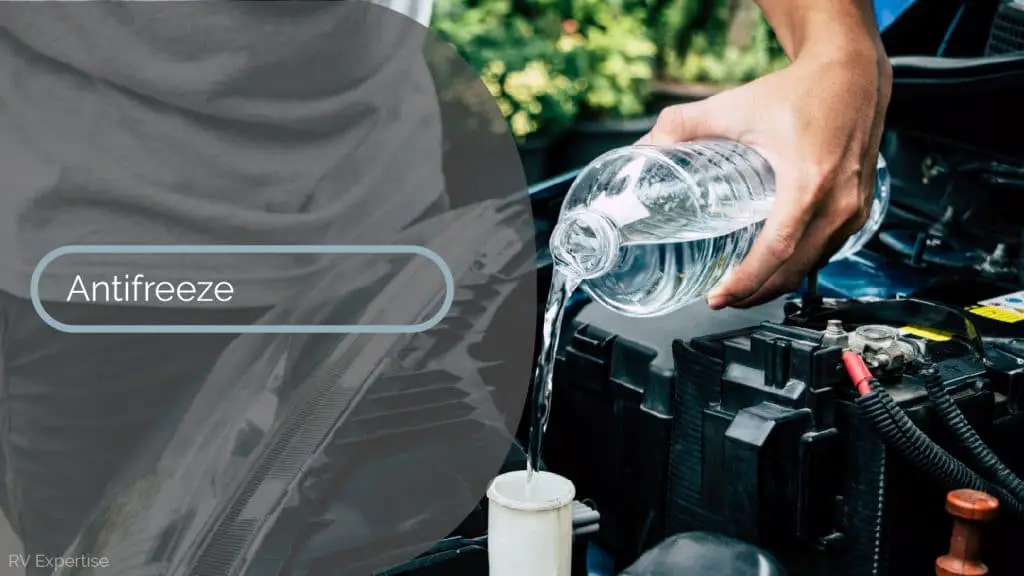
Essential RV Antifreeze Guide for Seasonal Storage
When the winter comes around and it’s time to winterize, RV Antifreeze is a necessity. It will protect the plumbing systems in your RV from freezing and ultimately getting permanently damaged.
RV antifreeze isn’t the same as your typical stuff for your car, however. Antifreeze for an RV is non-toxic, whereas for cars, it’s highly toxic, so be careful.
Standard car anti freeze would be fine for your RV engine, but the antifreeze were discussing in this article is for your pipe fittings and all the plumbing and stuff around your RV.
When used, RV anti freeze will prevent all your plumbing from freezing solid and potential damage. And you can also add it while you’re actually camping during the winter, putting some into your gray and black tanks is a good idea as it will prevent them from freezing up, too.
Anyway, as with everything else, not all antifreeze for RV are made the same, so we have reviewed them and picked out what we believe to be the best RV antifreeze products on the market.
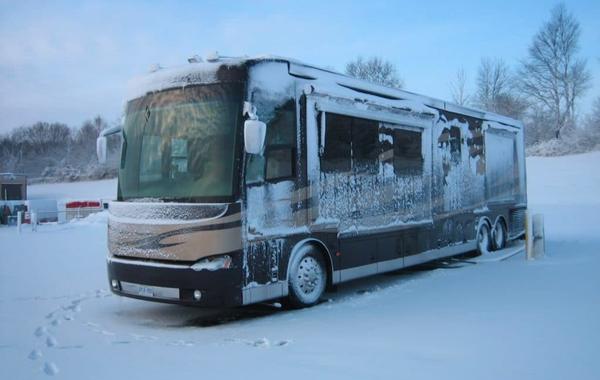
After the specific reviews, we’ve added a Buyer’s Guide where we go into more detail about what RV antifreeze is, and also look at the comparisons with other useful antifreeze products.
There’s also a step-by-step guide for how to prepare your rig for the winter and apply some RV anti freeze. And as with all our articles, we have an FAQ section dedicated to any questions we regularly get from our readership.
If you prefer, you can scroll straight down to the RV AntiFreeze Buyer’s Guide by clicking the link
Review of the Best RV Antifreeze
Now that you know a bit more about RV antifreeze, it’s time to go over the reviews. All products are well-researched, so we hope we can help you make an informed buying decision.
Splash Antifreeze Coolant, 1 Gallon
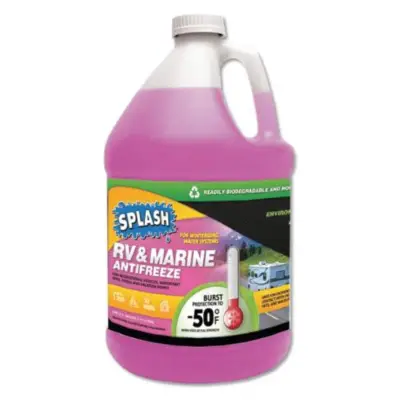
Splash Antifreeze Coolant is the best product on the market, and will keep your RV maintained during the winter. This product can provide you with the features a good RV antifreeze should have and at a reliable price point.
The Splash Antifreeze Coolant can be used for RVs as well as marine vehicles. It can also be used for all heavy-duty engines because of the corrosion protection provides. Using this anti freeze is easy because you won’t have to figure out a dilution ratio by mixing in water. Simply pour in the contents and that is it.
Being alerted about leakages during the initial stages of using an antifreeze is ideal, and the pink color will help you detect any possible leakage. It’s also non-toxic, so you don’t have to worry about the environment, or your kids and pets for that matter.
Another thing we really liked about this one is the price. It’s as good as any other and cheaper than most other RV antifreeze products that boast the same features.
Bottom Line
With the Splash Antifreeze Coolant, you have an antifreeze for RV you can depend on. Not needing to calculate a dilution ratio allows for more convenience in using this product. You can use this to protect the plumbing as well as metal parts from corrosion during winter. The only thing we don’t like about this is the bright color. It’s non-toxic, so nothing to be alarmed about, but the colorful packaging might attract kids. So, do keep it out of their reach.
Pros
- No need to dilute with water
- Offers corrosion protection to metal parts
- It can be used for RVs and marine vehicles
- The pink color helps with detecting early leakage
Cons
- The colorful packaging might increase the risk of kids thinking it’s a soda
RV/Marine Antifreeze (2-Pack) by TradeGrade
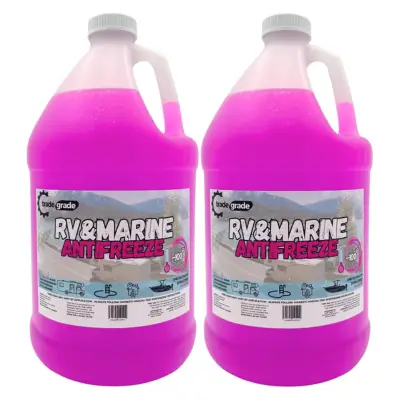
When the frost sets in, RV and boat owners know the dread of burst pipes and damaged systems. Enter TradeGrade’s RV/Marine Antifreeze, a game-changer in winterization products.
This 2-pack offering boasts a superior formula designed to dip the freezing point down to an impressive -100°F, ensuring that your recreational vehicles are snug as a bug in even the harshest of winters.
Ease of use is another highlight for this RV antifreeze. The 2-gallon pack size is thoughtfully designed, providing enough antifreeze to thoroughly protect an average-sized RV or marine vessel without the need for multiple purchases.
But what truly sets TradeGrade apart is its reliability. Professionals and seasoned RV enthusiasts trust this antifreeze for consistent performance. We have used it regularlyl over the years and it never lets us down.
Bottom Line
If you’re looking to safeguard your RV from the icy grip of winter, TradeGrade’s RV/Marine Antifreeze should be considered. Not only does it offer top-tier protection, but its formulation ensures peace of mind with its safety for all materials.
Pros
- Ultra-low freeze protection
- Non-toxic, safe materials
- Ideal pack size
- Professionally trusted
Cons
- May be excessive for small systems
- Storage space for smaller RVs
Century Heat Transfer Fluid, Non-Corrosive, Non-Toxic Propylene Glycol RV Antifreeze
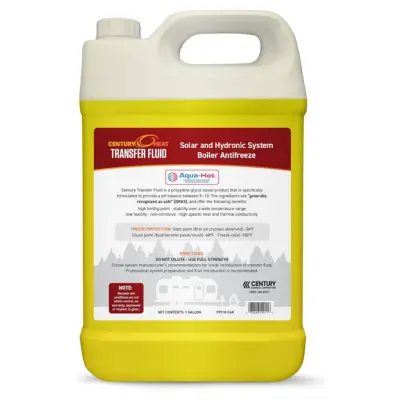
Century Heat’s Propylene Glycol RV Antifreeze is tailored for adventurers who refuse to let winter’s bite curb their travel plans. This heat transfer fluid goes well beyond simple antifreeze duties, and safeguards your RV’s plumbing and heating systems against the bite of the freezing winters.
The product excels with its propylene glycol base, offering robust freeze protection that keeps water lines, as well as solar, hydronic, and HVAC units, from turning into ice sculptures.
Safety isn’t an afterthought with Century Heat. It boasts GRAS (Generally Regarded As Safe) status, meaning it’s made from ingredients with very low toxicity. This makes it a responsible choice for both the user and the environment, something that aligns with most of us nature-loving RVers.
Where this fluid truly proves its worth, however, is in its thermal properties. Its high boiling point ensures efficient heat distribution throughout your RV’s heating system, promising warmth during middle of winter.
The 32 oz packaging option might seem small, but it’s designed with the RV lifestyle in mind, offering ease of storage and the flexibility to dilute according to your specific winterizing needs.
Bottom Line
Century Heat Transfer Fluid is a must-have for any RV or marine vessel owner looking to brave the cold. Its safe, effective, and thoughtful design ensures your heating systems are protected in the coldest of cold nights.
Pros
- Safe for all systems
- Eco-friendly formula
- Enhances system longevity
- Efficient heat transfer
Cons
- Needs diluting
Zerex Original Green Low Silicate Concentrate Antifreeze
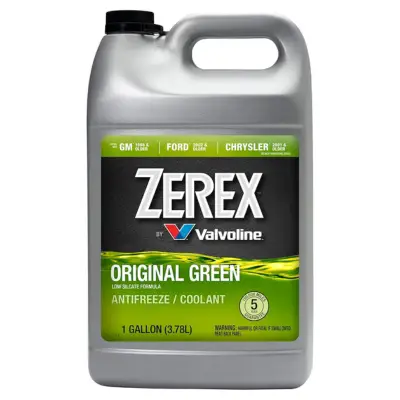
Zerex Original Green Antifreeze by Valvoline is a legacy product designed for those who take vehicle maintenance seriously. With a solid 4.8 out of 5 stars on Amazon, this concentrate has proven its worth among thousands of customers.
The first thing to note is its specific formulation. Unlike one-size-fits-all antifreezes, Zerex Green is tailored to meet the exact specifications of various vehicle manufacturers. This precision ensures optimal performance and protection against coolant system failures.
Temperature protection is robust, with this antifreeze safeguarding your engine down to -34°F. This makes it an excellent choice for those living in colder climates or facing harsh winters, ensuring your vehicle starts up smoothly every time.
The inclusion of patented organic acid corrosion inhibitors sets Zerex apart. These inhibitors offer extended protection against rust and corrosion, which are among the top culprits behind engine wear and tear. The longevity of your engine’s cooling system is significantly enhanced, saving you costly repairs down the line.
Bottom Line
Zerex Green is more than an antifreeze. It’s a comprehensive coolant solution for your vehicle, and offers peace of mind with its superior protection and compatibility.
Pros
- Meets specific auto specs
- Extended rust protection
- Cold weather performance
- Safety with bittering agent
Cons
- Requires mixing
- Pricey
Ultra1Plus Antifreeze Coolant – UltraCool Universal Premixed 50/50
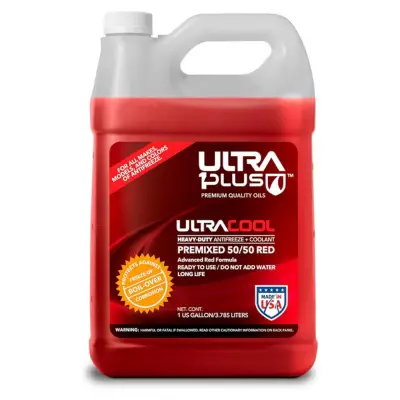
Ultra1Plus has engineered the UltraCool Universal Premixed 50/50 Antifreeze Coolant with the all vehicles in mind. This Antifreeze shines with its premixed formula, which means no mixing, no mess, and no mistakes. Simply pour straight into your radiator, and your vehicle maintenance is immediately underway.
The universal formula adheres to ASTM D 3306 and ASTM D 4985 standards, making it an all-in-one solution for virtually any car or heavy-duty diesel engine. This versatility eliminates the guesswork and the need for multiple coolant types cluttering your garage.
Where UltraCool truly excels is in its corrosion protection. Its low silicate, phosphate-free composition ensures that your engine components are shielded from rust and corrosion, significantly extending the life of your cooling system.
Ultra1Plus Antifreeze also includes a high-quality defoamer system that not only prevents boil-over but also protects the more delicate parts of your engine like hoses and plastic components from degradation.
Bottom Line
If you want an antifreeze coolant that offers ease, efficiency, and exceptional protection for a wide array of vehicles, Ultra1Plus UltraCool is your goto. It’s slightly higher in cost than comeptitors, but its convenience makes it worthwhile.
Pros
- No mixing required
- Wide vehicle compatibility
- Advanced corrosion protection
- Protects engine components
Cons
- Slightly higher cost
- Premixed might not suit all dilution needs
Star Brite Non-Toxic Anti-Freeze 6 Gallons
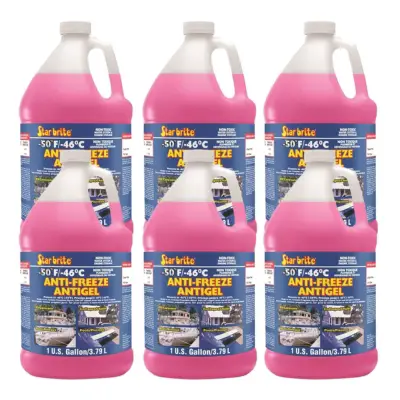
Last but definitely not least, Star Brite Non-Toxic Anti-Freeze is another reliable and fantastic winterizing solution that will protect your RV’s plumbing.
This RV antifreeze will ensure your RV is undamaged during the cold weather, with a burst protection to temperatures as low as -50°F (-46°C). The freeze protection is within a range of +12°F to +16°F (-11°C to -9°C).
This versatile product offers effective cold weather protection as well as protecting the drinking water systems, and even all engines from corrosion. It also helps prevent corrosion of copper, solder, brass, and aluminum, and also the hose materials or rubber seals.
Also, if you are worried about leaks, this RV antifreeze has a bright pink color which works to provide excellent visibility, so you’ll know immediately if you have a leak.
This is a non-alcoholic product and has been formulated with pure, non-toxic, USP-grade ingredients. You don’t have to dilute it either, making it nice and convenient for anyone. You should know that this product contains propylene glycol, but it doesn’t contain ethylene glycol.
As well as RVs, you can use this antifreeze for boats, pools, and even vacation homes. It also has corrosion inhibitors which offer protection for all metal engine components and seals.Bottom LineThe Star Brite Non-Toxic Anti-Freeze is an excellent, safe and clean product. It gives you the RV plumbing protection you wane. While some might be put off by the odor, this RV anti-freeze will get the job done throughout the winter.
Pros
- It is very easy to use
- Offers corrosion protection
- It is made of non-toxic materials
- It is safe for boats, RVs, and pools
- You don’t need to dilute this with water
Cons
- Some complaints about the odour
- 6 gallons takes up some space
Camco 40218 TastePURE Dewinterizer,16 oz.
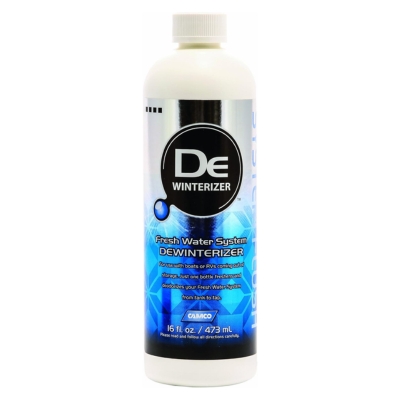
The transition from winter to spring often leaves RV and boat owners with the laborious job of flushing out their water systems. This is where Camco’s TastePURE Dewinterizer becomes an essential tool.
It’s important to note that this product isn’t an antifreeze but instead a specialized cleaning solution aimed at removing antifreeze residue from your water lines after you winterize your vehicle.
The 16 oz. bottle of TastePURE Dewinterizer is potent, and designed to freshen and deodorize your freshwater system from the tank right through to the tap. Whether you’re prepping your RV for a summer road trip or getting your boat ready for the season, Camco 40218 ensures your water tastes clean and is free from any lingering winterization chemicals.
With one bottle capable of treating up to 60 gallons of water, which is ample for most RV and marine freshwater systems, you get plenty of usage out of it.
It can also be used year-round. Not just for dewinterizing, it can be used for regular maintenance to keep your water system fresh, making it a handy solution for those who really look after their RV. And that’s everybody, right?.
Bottom Line
If you’re looking to ensure your RV or boat’s water system is clean and fresh after storage, Camco’s TastePURE Dewinterizer is fantastic. Say goodbye to the taste and smell of last season’s antifreeze and immediately enjoy pure-tasting water on your next adventure.
Pros
- Specifically designed for dewinterizing
- Deodorizes and freshens water systems
- Suitable for year-round use
- Treats up to 60 gallons
Cons
- Limited to cleaning, not for freeze protection
Buyer’s Guide
Now it’s time for our RV AntiFreeze Buyer’s Guide. Here you’ll learn exactly what antifreeze is and what it does. Not just any antifreeze either, because you need to get RV specific antifreeze. We compare RV antifreeze with others anyway, so by the end of the guide you’ll have a better understanding.
We’ve also included a step-by-step guide on how to put antifreeze in your RV, so you’ll have no problems doing so, when you need to. And as with all Buyer’s Guides, we end with an FAQ section, so you should have no stone left unturned.
What is RV Antifreeze and What Does it Do?
Before you jump ahead buying antifreeze for your RV, it will do you good to understand exactly what it does and why it’s essential. With the drop in temperature during the winter months, water pipes are at risk of freezing up and bursting. Having the water system burst into your RV leads to a lot of damage, and will cost a lot to repair.
To prevent this from happening, it’s recommended you use antifreeze. It’s a solution that helps prevent pipes from bursting by offering burst protection for temperatures as low as -50°F. So basically, using RV antifreeze means the water system pipes remain safe during winter.
How to Choose RV Antifreeze
While we’re happy to share our top recommendations for RV antifreeze currently available, we would like to ensure you know what features to look for before you look at each product.
Burst Protection
You should opt for an RV antifreeze product that offers effective protection against low temperatures. Go for a solution offering at least -50°F burst protection. There are antifreeze solutions which go even lower, but the -50°F mark is most common.
Environmentally-Friendly
Keeping your environment safe when using chemicals, is crucial. The product you select should be non-toxic and environmentally-friendly. Such an antifreeze for RV will also be safe to use around kids and pets.
Convenience
The convenience means how easy it is for you to use. Greater convenience is offered by antifreeze solutions which can be used right out of the bottle without adding water to dilute it.
Variety of Uses
It’s better to opt for some RV anti freeze that offers a wide range of uses. As well as using it for your RVs, get some that you could use on swimming pools, boats, and vacation homes etc. On top of this, antifreeze solutions that work with a variety of pipes (plastic, copper, brass, etc.) are also recommended.
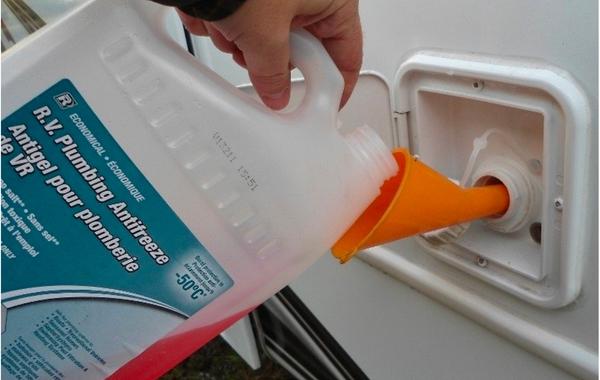
RV Antifreeze Types
The market is filled with different types of RV antifreeze for you, but there are three different types you should know about. The ideal one for you depends on what you‘re using the antifreeze for and the situation.
Ethanol-Based Antifreeze
Ethanol-based RV antifreeze, also known as an alcohol-based antifreeze, is a common option that’s widely available. You can easily find this product in most hardware and RV stores. It’s not only effective but it’s also a cheaper option. However, it is flammable, so be careful when using it.
Propylene Glycol-Based Antifreeze
Propylene glycol-based RV antifreeze is another option for you to consider. This is preferred by many, as it has a good effect on RVs, and is less toxic that makes it safe to use for your RV plumbing. It also acts as a lubricant and helps in increasing the life of all rubber seals in the pipes and plumbing lines. It’s also non-flammable, which makes it a safer option.

Propylene-Ethanol Blend Antifreeze
This is basically a combination of the two types of antifreeze mentioned above. Since it’s a combination of the two above, you need to note that the amount of ethanol present in this antifreeze is unknown. Therefore, be careful when using this fluid.
Comparison Overview
Before making your purchase, you should compare the different options available, so you can see which one would be the best option for you. Most people are often confused regarding the differences between RV antifreezes and what sets them apart. Allow us to explain these differences for you…
Swimming Pool Antifreeze vs. RV Antifreeze
Both swimming pool antifreeze and RV antifreeze are made using propylene glycol and are designed for preventing pipes from freezing. The main difference between the two is the color. While the swimming pool antifreeze is blue, the RV antifreeze is pink. The instructions for these two will likely differ, and so will the amount of water required for diluting them.
RV Antifreeze vs. Car Antifreeze
Most RV owners are aware of the fact that there’s a huge difference between an antifreeze for a car and one for an RV. The main difference is that RV antifreeze is non-toxic and made to be used for the plumbing system. On the other hand, automotive antifreeze is completely different and is genuinely toxic and meant to be used for the engine cooling system only.
Ethanol vs. Glycol RV Antifreeze
An RV antifreeze is a non-toxic fluid that’s meant to be pumped into the plumbing system. The main similarity between ethanol and glycol RV antifreeze is that they help raise the freezing point of water.
The former is usually cheaper, but it’s flammable, which makes it unsafe to use. Glycol is a bit more expensive, but it’s non-flammable, which makes it a lot safer.
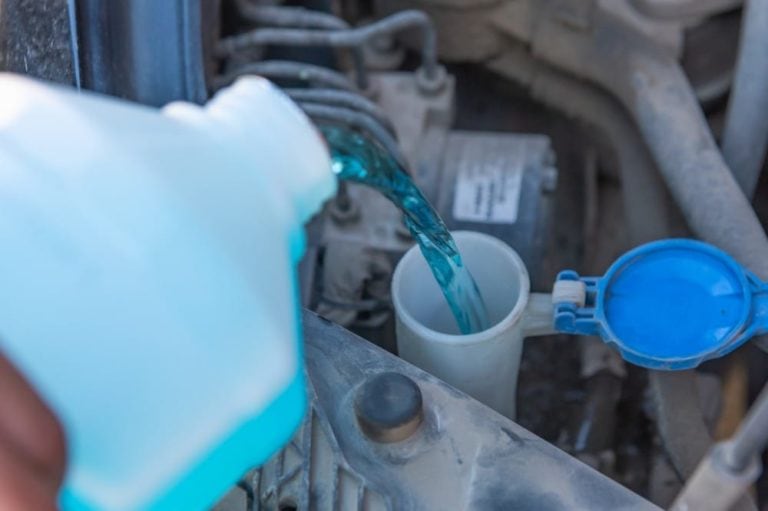
Blowing Out RV Water Lines vs. Antifreeze
If you’re trying to get rid of the water from the water lines, you can use the blowout method or use an RV antifreeze. For the blowout method, you need an air compressor along with a blowout plug to expel the water from the system. Although it is the easiest method, it doesn’t get all the water out of the system.
On the other hand, RV antifreeze is a more reliable method of removing water. This method ensures that all of the water is removed. For this, you’ll need around two to three gallons of RV antifreeze, depending on how big your RV is.
How to Put Antifreeze in an RV
In case you’re worried about how to clean your water tanks and how to make use of the antifreeze, here’s a detailed guide for you to follow.
1. Clean the grey and black tank, drain them and fill them with fresh water. And then leave both the gate valves open so that they’re completely clean.
2. Drain the water heater, open up the pressure relief valve, and relieve any pressure in the system. This disconnects the water, and there is no water going down the coach. The water pump is now off, and there is no pressure, so you can then close the relief valve and simultaneously take the drain plug out so that it doesn’t blow out.
3. Now using an Atwood, a wood that has a plastic plug attached to an anode rod, take it out, and water will start coming out.
4. Then reopen the pressure relief valve at a quicker speed. When it’s almost empty, go over to your freshwater city and close the pressure relief valve.
5. Look for your city water connection; usually, it’s under the slide. Using a plug, screw into the hose outlet and connect your compressor to it. The compressor can be at 30 psi and will easily blow the air out. Make sure all of your facets are closed, and the air will blow out all of the water from the heater.
6. Once the water stops coming out, disconnect the air from the rig. Now, you can bypass the hot water heater and disconnect it.
7. Turn off the cold and hot water valves once, so that no water goes in or comes out. Then turn the bypass valve, so all the cold water will go into the hot water line without going into the hot water heater. That is bypassing.
8. At the city inlet, reconnect the air compressor and start turning on the faucets one by one to drain out all the water. This way, there is no water left that might dilute the antifreeze.
9. Now coming to the water bay, turn your whole house filter off and take it out. A little tip is that you can put an empty water bottle inside the filter so that you don’t use too much antifreeze.
10. Place the housing back in.
11. Take the winterizing hose off. Now, take the RV antifreeze and stick the winterizing kit hose inside the bottom. Turn the water pump on to pressurize the system and turn the faucet on one by one. You’ll see the colored antifreeze coming out. Now the hot water heater is done.
12. Go to the gate valves and close the grey and black water tank. Now, pour the remaining antifreeze down the drain. Make sure to wipe any plastic bits to prevent staining.
In case you are still confused regarding the procedure, refer to the following video to overcome your queries.
People Also Ask – RV Anti Freeze FAQs
Buying the right antifreeze for your RV can be quite a difficult task, considering all the multiple options available. All options above are recommended, but if you still have some unanswered questions, keep reading…
What’s the difference between RV antifreeze and regular antifreeze?
Is RV antifreeze safe for septic systems?
What is the best way to dispose of antifreeze?
What is RV antifreeze made of – is it safe?
What does antifreeze smell like?
Where should I recycle antifreeze?
How often should you change your antifreeze?
How much antifreeze should I use to winterize my RV?
What happens if you use the wrong color antifreeze?
If you end up using a different-colored antifreeze without removing the previous one you used, you will notice that the two will not mix well and will end up forming a gel-like substance. This gel-like substance causes blockages, causing the engine to overheat and damage the radiator, water jackets, and the heater core. Moreover, at times, even the water pump overheats and fails.
What color is RV antifreeze?
You should have a look at the temperature rating before you purchase one for your RV. Make sure to go through the instructions and see which fluid is recommended.
How do I get the antifreeze out of my RV?
All of the antifreeze residue will be in the holding tanks, which you can later empty at a dump station. And if, for any particular reason, you have added some RV antifreeze to your freshwater holding tank, then you will have to drain it before you add any potable water to the tank.
At what temperature does RV antifreeze freeze?
However, it is important to understand that the reading may differ by several degrees from what is stated on the product due to its surrounding temperature or because of the age of the product. Therefore, a -50°F product might be expected to have a reading of +12°F, but instead, you might see a reading that falls in a range of +12°F to +16°F, so it depends on a few factors.
How do I get rid of RV antifreeze smell?
How many gallons of antifreeze do I for my RV?
How much RV antifreeze is needed per gallon of water?
RV Antifreeze – Look After Your RV Plumbing in The Depths of Winter
Antifreeze will ensure your RV is well looked after during the winter. It will protect all the plumbing that might otherwise succumb to the sub-zero temperatures. It’s not much hassle, and is relatively cheap to buy, and it will save you a lot of money.
We hope our best RV antifreeze review helped you in your search. They’re all good quality, and you should be safe in the knowledge that whichever you opted for, your RV will be safe this winter.

Hello, fellow wanderers! I’m Alyssia. Since 2008, my husband and I have called an RV our home, journeying through life one mile at a time. Our nomadic lifestyle has led us to over 70 countries, each with their unique tales that have shaped our own.
I share our stories and insights right here, hoping to inspire and guide you in your own adventures. Expect tips on RV living, our favorite camping spots, breathtaking hiking trails, and the joys and challenges of an ever-changing view from our window. Alongside, you’ll also find practical advice on outdoorsy stuff, designed to equip you for any journey. Join us as we continue to explore the vast, beautiful world on wheels!




